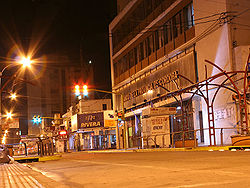This article has multiple issues. Please help improve it or discuss these issues on the talk page. (Learn how and when to remove these messages)
|
Bell Ville | |
|---|---|
 | |
| Nickname: Bell Ville | |
| Coordinates: 32°38′S 62°41′W / 32.633°S 62.683°W | |
| Country | |
| Province | |
| Department | Unión |
| Area | |
| • Total | 41.77 km2 (16.13 sq mi) |
| Elevation | 130 m (430 ft) |
| Population (2010 census) | |
| • Total | 33,835 |
| • Density | 810/km2 (2,100/sq mi) |
| Time zone | UTC−3 (ART) |
| CPA base | X2550 |
| Dialing code | +54 3537 |
Bell Ville is a city about 200 km southeast of Córdoba, the capital of Córdoba Province of Argentina. It lies at the junction of National Route 9, National Route 3 and the Córdoba–Rosario–Buenos Aires railroad. Bell Ville is also the capital of the Unión Department in south-eastern Córdoba. Throughout its history, Bell Ville has evolved from a ranch and village to a military fort, customs inspection and control point, and ultimately, a recognized town and city. Notably, in 1866, Bell Ville was proposed as the potential capital of the Argentine Republic.
In the place where the city stands today, a friar died under unknown circumstances, and neither his name nor his religious congregation became known. Consequently, the area was initially called "Fraile Muerto" (Dead Friar).
Bell Ville is located in the Humid Pampas region, along the banks of the Ctalamochita River (also known as Río Tercero), at kilometer 500 of National Route 9 where it intersects with National Route 3 (Argentina). It is traversed by the significant broad-gauge railway branch of the General Bartolomé Mitre Railway, which connects the city of Córdoba, Argentina with Buenos Aires via Rosario. Bell Ville's location is equidistant from the two most important cities on National Route 9, lying 200 km southeast of Córdoba and 200 km northwest of Rosario.
Besides primary activities like agriculture (soybeans, wheat, sunflowers, maize) and cattle farming, and secondary ones (elaborated products of the aforementioned), Bell Ville has a peculiar local industry: the manufacturing of footballs. The city prides itself in being the "National Capital of the Football".

